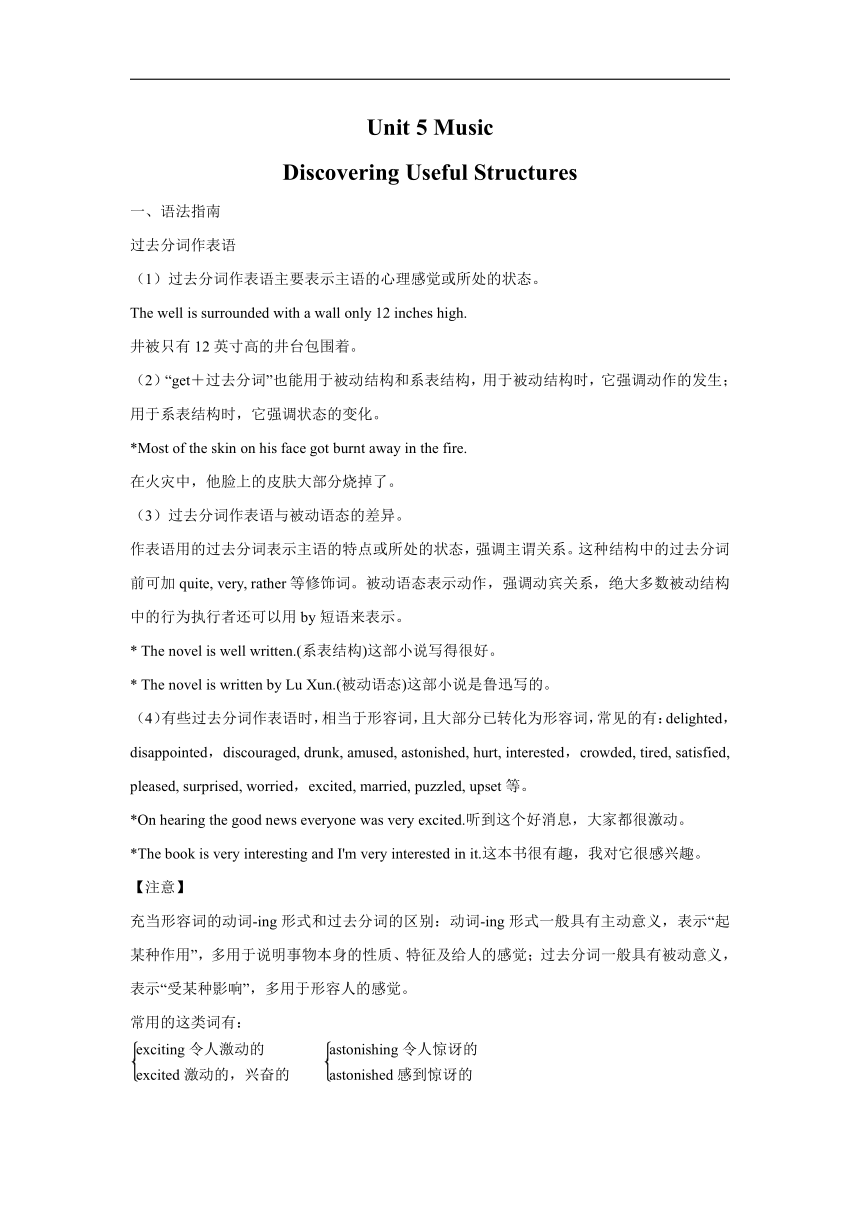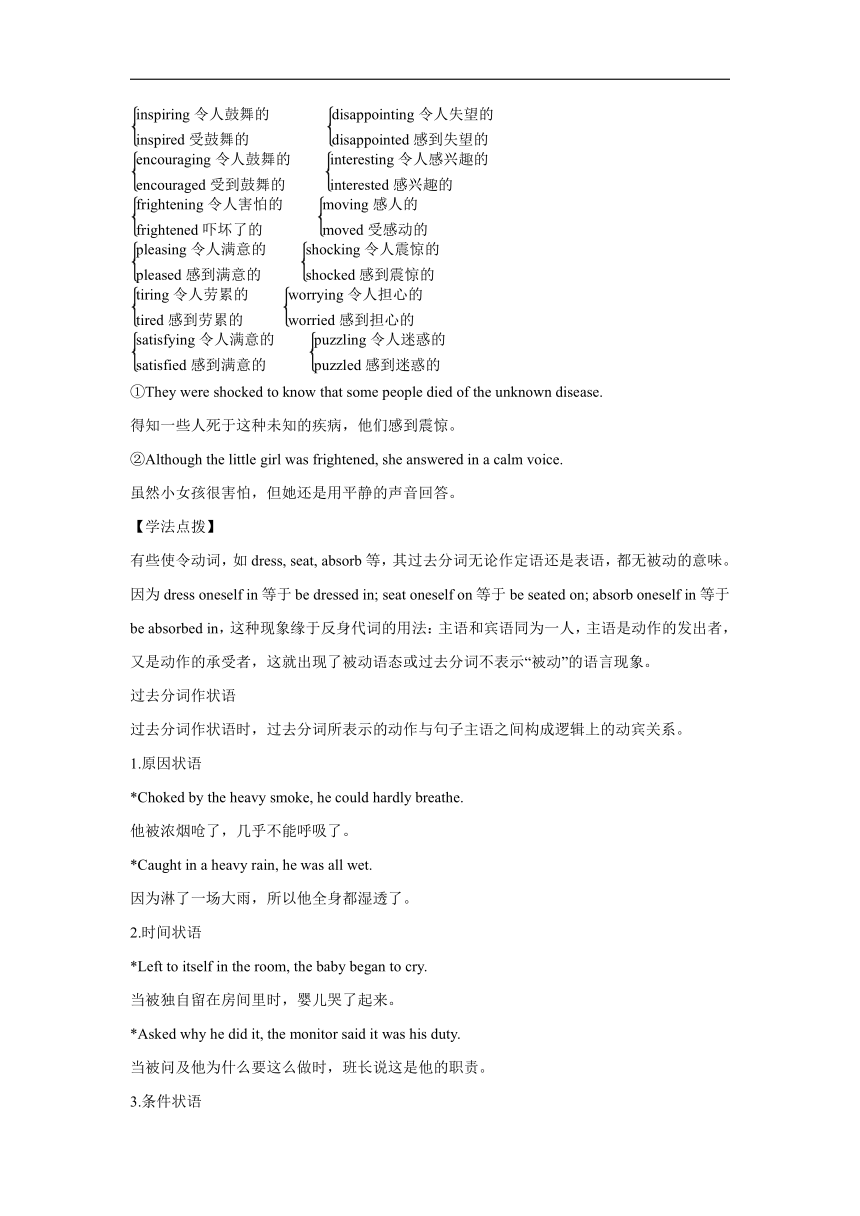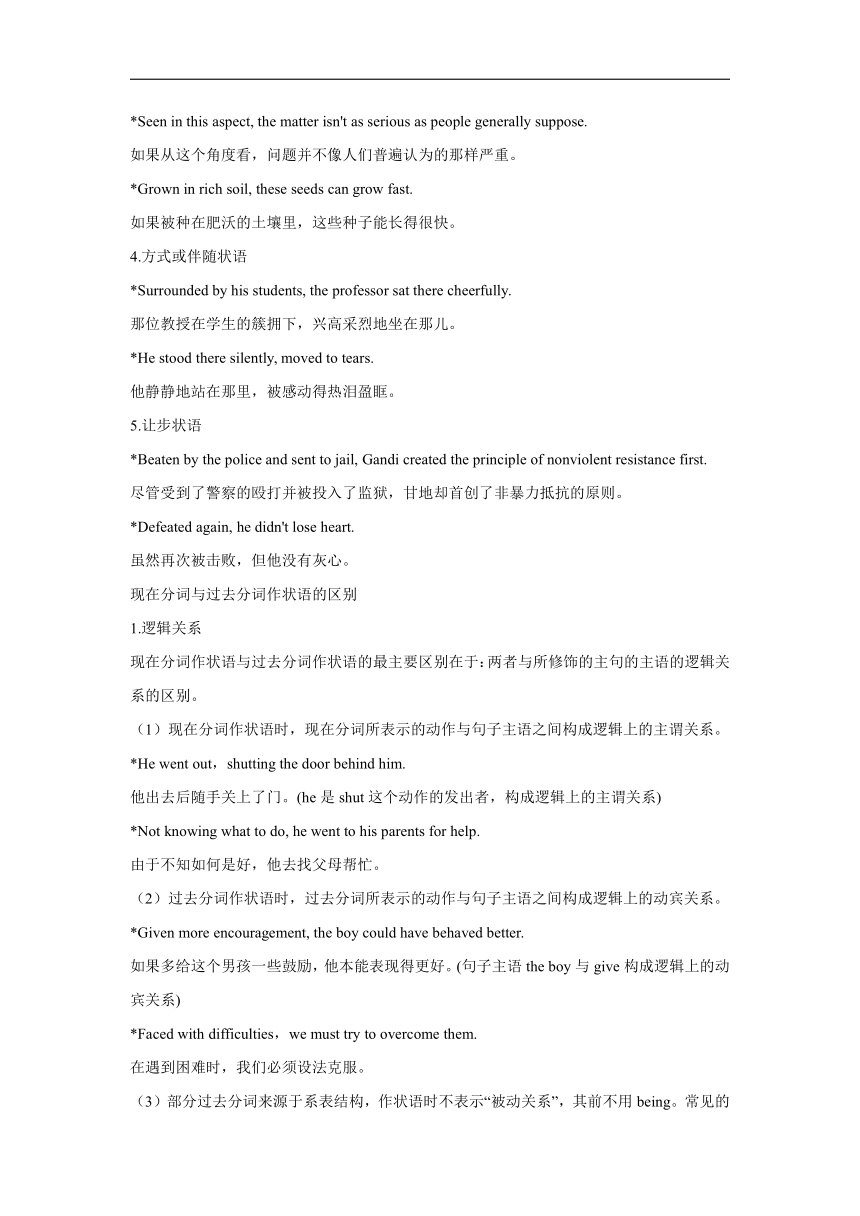2022-2023学年人教版(2019)必修二:Unit 5 Music Discovering Useful Structures 学案(含解析)
文档属性
| 名称 | 2022-2023学年人教版(2019)必修二:Unit 5 Music Discovering Useful Structures 学案(含解析) |  | |
| 格式 | doc | ||
| 文件大小 | 21.1KB | ||
| 资源类型 | 教案 | ||
| 版本资源 | 人教版(2019) | ||
| 科目 | 英语 | ||
| 更新时间 | 2022-09-01 12:27:51 | ||
图片预览



文档简介
Unit 5 Music
Discovering Useful Structures
一、语法指南
过去分词作表语
(1)过去分词作表语主要表示主语的心理感觉或所处的状态。
The well is surrounded with a wall only 12 inches high.
井被只有12英寸高的井台包围着。
(2)“get+过去分词”也能用于被动结构和系表结构,用于被动结构时,它强调动作的发生;用于系表结构时,它强调状态的变化。
*Most of the skin on his face got burnt away in the fire.
在火灾中,他脸上的皮肤大部分烧掉了。
(3)过去分词作表语与被动语态的差异。
作表语用的过去分词表示主语的特点或所处的状态,强调主谓关系。这种结构中的过去分词前可加quite, very, rather等修饰词。被动语态表示动作,强调动宾关系,绝大多数被动结构中的行为执行者还可以用by短语来表示。
* The novel is well written.(系表结构)这部小说写得很好。
* The novel is written by Lu Xun.(被动语态)这部小说是鲁迅写的。
(4)有些过去分词作表语时,相当于形容词,且大部分已转化为形容词,常见的有:delighted,disappointed,discouraged, drunk, amused, astonished, hurt, interested,crowded, tired, satisfied, pleased, surprised, worried,excited, married, puzzled, upset等。
*On hearing the good news everyone was very excited.听到这个好消息,大家都很激动。
*The book is very interesting and I'm very interested in it.这本书很有趣,我对它很感兴趣。
【注意】
充当形容词的动词-ing形式和过去分词的区别:动词-ing形式一般具有主动意义,表示“起某种作用”,多用于说明事物本身的性质、特征及给人的感觉;过去分词一般具有被动意义,表示“受某种影响”,多用于形容人的感觉。
常用的这类词有:
①They were shocked to know that some people died of the unknown disease.
得知一些人死于这种未知的疾病,他们感到震惊。
②Although the little girl was frightened, she answered in a calm voice.
虽然小女孩很害怕,但她还是用平静的声音回答。
【学法点拨】
有些使令动词,如dress, seat, absorb等,其过去分词无论作定语还是表语,都无被动的意味。因为dress oneself in等于be dressed in; seat oneself on等于be seated on; absorb oneself in等于be absorbed in,这种现象缘于反身代词的用法:主语和宾语同为一人,主语是动作的发出者,又是动作的承受者,这就出现了被动语态或过去分词不表示“被动”的语言现象。
过去分词作状语
过去分词作状语时,过去分词所表示的动作与句子主语之间构成逻辑上的动宾关系。
1.原因状语
*Choked by the heavy smoke, he could hardly breathe.
他被浓烟呛了,几乎不能呼吸了。
*Caught in a heavy rain, he was all wet.
因为淋了一场大雨,所以他全身都湿透了。
2.时间状语
*Left to itself in the room, the baby began to cry.
当被独自留在房间里时,婴儿哭了起来。
*Asked why he did it, the monitor said it was his duty.
当被问及他为什么要这么做时,班长说这是他的职责。
3.条件状语
*Seen in this aspect, the matter isn't as serious as people generally suppose.
如果从这个角度看,问题并不像人们普遍认为的那样严重。
*Grown in rich soil, these seeds can grow fast.
如果被种在肥沃的土壤里,这些种子能长得很快。
4.方式或伴随状语
*Surrounded by his students, the professor sat there cheerfully.
那位教授在学生的簇拥下,兴高采烈地坐在那儿。
*He stood there silently, moved to tears.
他静静地站在那里,被感动得热泪盈眶。
5.让步状语
*Beaten by the police and sent to jail, Gandi created the principle of nonviolent resistance first.
尽管受到了警察的殴打并被投入了监狱,甘地却首创了非暴力抵抗的原则。
*Defeated again, he didn't lose heart.
虽然再次被击败,但他没有灰心。
现在分词与过去分词作状语的区别
1.逻辑关系
现在分词作状语与过去分词作状语的最主要区别在于:两者与所修饰的主句的主语的逻辑关系的区别。
(1)现在分词作状语时,现在分词所表示的动作与句子主语之间构成逻辑上的主谓关系。
*He went out,shutting the door behind him.
他出去后随手关上了门。(he是shut这个动作的发出者,构成逻辑上的主谓关系)
*Not knowing what to do, he went to his parents for help.
由于不知如何是好,他去找父母帮忙。
(2)过去分词作状语时,过去分词所表示的动作与句子主语之间构成逻辑上的动宾关系。
*Given more encouragement, the boy could have behaved better.
如果多给这个男孩一些鼓励,他本能表现得更好。(句子主语the boy与give构成逻辑上的动宾关系)
*Faced with difficulties,we must try to overcome them.
在遇到困难时,我们必须设法克服。
(3)部分过去分词来源于系表结构,作状语时不表示“被动关系”,其前不用being。常见的这种过去分词及短语有:lost in(陷入某种状态),seated(坐着的),hidden(躲着),lost/absorbed(沉溺于),born in(出生于),dressed in(穿着),tired of(厌烦了)等。
*Lost/Absorbed in deep thought, he didn't hear the sound.
因为陷入沉思中,所以他没有听到那个声音。
*Born in this beautiful town, he hates to leave it.
出生于这个美丽的小镇,他不愿离开它。
2.时间概念
过去分词所表示的动作发生在谓语动作之前,或表示“一种状态”,与谓语动作同时发生或存在。现在分词的一般式(doing)表示的动作与谓语动作同时发生或在说话时正在进行。
*Written in a hurry, this article was not so good.
因为写得匆忙,这篇文章不是很好。
*Reading carefully, he found something he hadn't known before.
他仔细读书时,发现了一些从前不知道的东西。
分词作状语记忆口诀
分词作状语,主语是问题。
逗号前后两动作,共用一主语。
主语找出后,再来断关系。
主动用v.-ing,被动用v.-ed。
having done表先后,千万要记住。
一般来说,不论是动词不定式作状语、-ing分词作状语,还是过去分词作状语,其逻辑主语必须是句子的主语。但是,有一些非谓语动词短语已经游离出来,成为单独的短语,在句子中作状语。
二、同步练习
(一)
1. Ordinary soap, _____ (use) correctly, can deal with bacteria effectively.
2. There are some health problems that, when not _____ (treat) in time, can become bigger ones later on.
3. _____ (open) in 1955, Disneyland in California is regarded by many as the original fun park.
4. One was that I was _________ (amaze) at the fact that a sick person could feel much more better after seeing a doctor.
5._____ (found) in the early 20th century, the school keeps on inspiring children's love of art.
(二)
6.猎人离开了房子,他的猎狗紧跟着他。
_____________________________________________________________________
7.和你相比,我还有很长的路要走。
_____________________________________________________________________
8.被问及为什么编出这样的借口,年轻人一声不吭。
_____________________________________________________________________
9.尽管提醒了多次,但是这个女孩不听我们的忠告。
_____________________________________________________________________
10.要是被邀请的话.我就参加你的聚会。
_____________________________________________________________________
答案以及解析
二、
(一)
1.答案:used
解析:句中"_____ correctly"为条件状语, use与其逻辑主语"Ordinary soap"之间为动宾关系, 需用过去分词。
2.答案:treated
3.答案:Opened
4.答案:amazed
5.答案:Founded
解析:句意为: 建于20世纪早期, 这所学校一直在激发学生对艺术的热爱。found是及物动词, 意为"建立", 此处应用非谓语动词作状语, 设空处与其逻辑主语the school为被动关系, 故填过去分词形式表示完成和被动。
(二)
6.答案:The hunter left the house, closely followed by his hunting dog.
7.答案:Compared with you, I still have a long way to go.
8.答案:Asked why he had made up such an excuse, the young man kept silent.
9.答案:Though warned several times, the girl wouldn't follow our advice.
10.答案:I will attend your party if invited.
Discovering Useful Structures
一、语法指南
过去分词作表语
(1)过去分词作表语主要表示主语的心理感觉或所处的状态。
The well is surrounded with a wall only 12 inches high.
井被只有12英寸高的井台包围着。
(2)“get+过去分词”也能用于被动结构和系表结构,用于被动结构时,它强调动作的发生;用于系表结构时,它强调状态的变化。
*Most of the skin on his face got burnt away in the fire.
在火灾中,他脸上的皮肤大部分烧掉了。
(3)过去分词作表语与被动语态的差异。
作表语用的过去分词表示主语的特点或所处的状态,强调主谓关系。这种结构中的过去分词前可加quite, very, rather等修饰词。被动语态表示动作,强调动宾关系,绝大多数被动结构中的行为执行者还可以用by短语来表示。
* The novel is well written.(系表结构)这部小说写得很好。
* The novel is written by Lu Xun.(被动语态)这部小说是鲁迅写的。
(4)有些过去分词作表语时,相当于形容词,且大部分已转化为形容词,常见的有:delighted,disappointed,discouraged, drunk, amused, astonished, hurt, interested,crowded, tired, satisfied, pleased, surprised, worried,excited, married, puzzled, upset等。
*On hearing the good news everyone was very excited.听到这个好消息,大家都很激动。
*The book is very interesting and I'm very interested in it.这本书很有趣,我对它很感兴趣。
【注意】
充当形容词的动词-ing形式和过去分词的区别:动词-ing形式一般具有主动意义,表示“起某种作用”,多用于说明事物本身的性质、特征及给人的感觉;过去分词一般具有被动意义,表示“受某种影响”,多用于形容人的感觉。
常用的这类词有:
①They were shocked to know that some people died of the unknown disease.
得知一些人死于这种未知的疾病,他们感到震惊。
②Although the little girl was frightened, she answered in a calm voice.
虽然小女孩很害怕,但她还是用平静的声音回答。
【学法点拨】
有些使令动词,如dress, seat, absorb等,其过去分词无论作定语还是表语,都无被动的意味。因为dress oneself in等于be dressed in; seat oneself on等于be seated on; absorb oneself in等于be absorbed in,这种现象缘于反身代词的用法:主语和宾语同为一人,主语是动作的发出者,又是动作的承受者,这就出现了被动语态或过去分词不表示“被动”的语言现象。
过去分词作状语
过去分词作状语时,过去分词所表示的动作与句子主语之间构成逻辑上的动宾关系。
1.原因状语
*Choked by the heavy smoke, he could hardly breathe.
他被浓烟呛了,几乎不能呼吸了。
*Caught in a heavy rain, he was all wet.
因为淋了一场大雨,所以他全身都湿透了。
2.时间状语
*Left to itself in the room, the baby began to cry.
当被独自留在房间里时,婴儿哭了起来。
*Asked why he did it, the monitor said it was his duty.
当被问及他为什么要这么做时,班长说这是他的职责。
3.条件状语
*Seen in this aspect, the matter isn't as serious as people generally suppose.
如果从这个角度看,问题并不像人们普遍认为的那样严重。
*Grown in rich soil, these seeds can grow fast.
如果被种在肥沃的土壤里,这些种子能长得很快。
4.方式或伴随状语
*Surrounded by his students, the professor sat there cheerfully.
那位教授在学生的簇拥下,兴高采烈地坐在那儿。
*He stood there silently, moved to tears.
他静静地站在那里,被感动得热泪盈眶。
5.让步状语
*Beaten by the police and sent to jail, Gandi created the principle of nonviolent resistance first.
尽管受到了警察的殴打并被投入了监狱,甘地却首创了非暴力抵抗的原则。
*Defeated again, he didn't lose heart.
虽然再次被击败,但他没有灰心。
现在分词与过去分词作状语的区别
1.逻辑关系
现在分词作状语与过去分词作状语的最主要区别在于:两者与所修饰的主句的主语的逻辑关系的区别。
(1)现在分词作状语时,现在分词所表示的动作与句子主语之间构成逻辑上的主谓关系。
*He went out,shutting the door behind him.
他出去后随手关上了门。(he是shut这个动作的发出者,构成逻辑上的主谓关系)
*Not knowing what to do, he went to his parents for help.
由于不知如何是好,他去找父母帮忙。
(2)过去分词作状语时,过去分词所表示的动作与句子主语之间构成逻辑上的动宾关系。
*Given more encouragement, the boy could have behaved better.
如果多给这个男孩一些鼓励,他本能表现得更好。(句子主语the boy与give构成逻辑上的动宾关系)
*Faced with difficulties,we must try to overcome them.
在遇到困难时,我们必须设法克服。
(3)部分过去分词来源于系表结构,作状语时不表示“被动关系”,其前不用being。常见的这种过去分词及短语有:lost in(陷入某种状态),seated(坐着的),hidden(躲着),lost/absorbed(沉溺于),born in(出生于),dressed in(穿着),tired of(厌烦了)等。
*Lost/Absorbed in deep thought, he didn't hear the sound.
因为陷入沉思中,所以他没有听到那个声音。
*Born in this beautiful town, he hates to leave it.
出生于这个美丽的小镇,他不愿离开它。
2.时间概念
过去分词所表示的动作发生在谓语动作之前,或表示“一种状态”,与谓语动作同时发生或存在。现在分词的一般式(doing)表示的动作与谓语动作同时发生或在说话时正在进行。
*Written in a hurry, this article was not so good.
因为写得匆忙,这篇文章不是很好。
*Reading carefully, he found something he hadn't known before.
他仔细读书时,发现了一些从前不知道的东西。
分词作状语记忆口诀
分词作状语,主语是问题。
逗号前后两动作,共用一主语。
主语找出后,再来断关系。
主动用v.-ing,被动用v.-ed。
having done表先后,千万要记住。
一般来说,不论是动词不定式作状语、-ing分词作状语,还是过去分词作状语,其逻辑主语必须是句子的主语。但是,有一些非谓语动词短语已经游离出来,成为单独的短语,在句子中作状语。
二、同步练习
(一)
1. Ordinary soap, _____ (use) correctly, can deal with bacteria effectively.
2. There are some health problems that, when not _____ (treat) in time, can become bigger ones later on.
3. _____ (open) in 1955, Disneyland in California is regarded by many as the original fun park.
4. One was that I was _________ (amaze) at the fact that a sick person could feel much more better after seeing a doctor.
5._____ (found) in the early 20th century, the school keeps on inspiring children's love of art.
(二)
6.猎人离开了房子,他的猎狗紧跟着他。
_____________________________________________________________________
7.和你相比,我还有很长的路要走。
_____________________________________________________________________
8.被问及为什么编出这样的借口,年轻人一声不吭。
_____________________________________________________________________
9.尽管提醒了多次,但是这个女孩不听我们的忠告。
_____________________________________________________________________
10.要是被邀请的话.我就参加你的聚会。
_____________________________________________________________________
答案以及解析
二、
(一)
1.答案:used
解析:句中"_____ correctly"为条件状语, use与其逻辑主语"Ordinary soap"之间为动宾关系, 需用过去分词。
2.答案:treated
3.答案:Opened
4.答案:amazed
5.答案:Founded
解析:句意为: 建于20世纪早期, 这所学校一直在激发学生对艺术的热爱。found是及物动词, 意为"建立", 此处应用非谓语动词作状语, 设空处与其逻辑主语the school为被动关系, 故填过去分词形式表示完成和被动。
(二)
6.答案:The hunter left the house, closely followed by his hunting dog.
7.答案:Compared with you, I still have a long way to go.
8.答案:Asked why he had made up such an excuse, the young man kept silent.
9.答案:Though warned several times, the girl wouldn't follow our advice.
10.答案:I will attend your party if invited.
